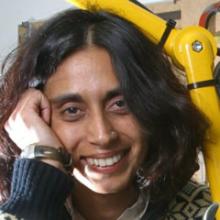Primary tabs
Arti Ahluwalia

Arti Ahluwalia was born in Kenya and educated in the UK. She has a B.Sc. Physics from Univerisity of Bath, M.Sc. in Instrumentation and Analytical Science from the University of Manchester (formerly UMIST), UK and a Ph.D. in Bioengineering from the Polytechnic of Milan, Italy. Her research interests are in in-vitro models of integrative pathophysiology and associated innovative materials and advanced cell culture systems. She is also involved in capacity building in the field of Biomedical Engineering, in association with UNECA, FABLAB Pisa and ABEC (the African Biomedical Engineering Consortium).
Research
Professor of Bioengineering and member of the Research Center "E. Piaggio"'s Human-Relevant Models (HRM) Group and the NanoBioscopy Lab. She is director of the Interuniversity Center for the Promotion of the 3Rs Principles in Teaching and Research (Centro 3R). Although highly multidisciplinary in nature, her research has centered on the interaction between biological systems and man-made devices or structures focused on the creation of human- based organ and system models in-vitro and in-silico models using soft and smart materials, cells and tissue derivatives, cell imaging, computational methods and intelligent bioreactor design as a way towards understanding tissue cross talk and how this cross talk is used to orchestrate systemic physiology. The applications span from disease models to alternatives to animal testing. In this context, her research experience encompasses cellular biotechnology, biomolecular films, surface engineering, and biosensing to microfabrication and biomaterials for tissue engineering. The work on organ and organoid models, sensors, biosensors and tissue engineering is undertaken in collaboration with a number of biological and clinical scientists at the Institute of Clinical Physiology (CNR) and the Department of Translational Medicine and is testament to the transdisciplinary nature of her research. Author of over 150 peer-reviewed publications and of several patents on microfabrication and on microfabricated multicompartment bioreactors, now commercial products of 2 companies (Kirkstall Ltd, IVTech srl.) she co-founded. Current projects are on tissue regeneration, biosensing, bioreactors, in-vitro models of metabolic disease and ageing (SINERGIA), biomimetic systems for the replacement of animal tests and nanotoxicology (Patrols, 3R funding), advanced imaging (DataBrain, SENSEI) and open biomedical engineering in education (UBORA, ABEM).
Teaching
- Biomeccanica dei Tessuti - Corso di Laurea di Primo Livello in Ingegneria Biomedica
- Tecnologie per la Medicina Regenerativa - Corso di Laurea Magistrale in Ingegneria Biomedica
- Fenomeni di Trasporto Biologico- Corso di Laurea di Primo Livello in Ingegneria Biomedica
- Micro & Nanobioscopy- Corso di Laurea Magistrale in Ingegneria Biomedica
- Materiali Intelligenti-Corso di Laurea Magistrale in Ingegneria Biomedica
- Design principles for Bionics Engineering - Corso di Laurea Magistrale in Bionics Engineering
- ECMB (Elementi costruttivi di macchine biomediche) -Corso di Laurea di Primo Livello in Ingegneria Biomedica
- Tesi LM e Triennale disponibili
- Tesi LM e LT disponibili a CNR Istituto di Fisiologia Clinica
- FAQs e Calendario con le modalità di esame
- Link per chiedere la verbalizzazione

